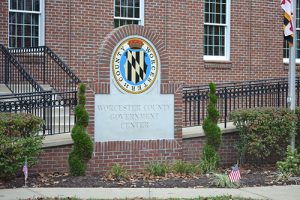
BERLIN — While about a third of the jurisdictions in Maryland have decided to allow residents to prepay 2018 property taxes to take advantage of the property tax deduction in advance of sweeping federal tax reforms, Worcester County is not following suit.
At least eight counties in Maryland, including most recently Wicomico, are allowing residents to prepay real estate taxes on their properties for 2018 before the new federal tax law approved by Congress goes into effect Jan. 1. The concept is to give residents the opportunity to take advantage of a last-minute property tax deduction before a new law passed as part of the controversial federal tax reform bill caps the property tax deduction at $10,000.
Last week, five counties in Maryland including Anne Arundel, Baltimore, Carroll, Harford and Howard, along with Baltimore City, voted to allow residents in those jurisdictions to prepay property taxes for 2018 in 2017 to take advantage of the existing real estate property tax deduction before it goes away. This week, the Wicomico County Council took the same action.
On Tuesday, the Montgomery County Council met in a special session during a holiday week and voted to approve the same opportunity for its residents. By Tuesday night, Ocean City Mayor Rick Meehan had fired off an email to the Worcester County Commissioners urging them to take similar measures.
“Bold move by the Montgomery County Commissioners to represent the taxpayers of their county,” Meehan’s email to the commissioners reads. “I believe the taxpayers of Worcester County would support the Worcester County Commissioners if they were to take the same action.”
Thus far, with the clock ticking on 2017, the Worcester County Commissioners have not shown any inclination to follow suit. On Thursday morning, the Worcester County government posted a response on its website and social media platforms.
“Worcester County does not accept prepayment of future taxes that are not yet levied or billed,” the county’s statement reads. “The IRS recently released an advisory on the limitation of taking a deduction on the prepayment of property taxes.”
The IRS statement attempts to explain the nuances of the property tax prepayment issue.
“The IRS has received a number of questions from the tax community concerning the deductibility of prepaid real property taxes,” the IRS statement reads. “In general, whether a taxpayer is allowed a deduction for the prepayment of state or local real property taxes in 2017 depends on whether the taxpayer makes the payment in 2017 and the real property taxes are assessed prior to 2018. A prepayment of anticipated real property taxes that have not been assessed prior to 2018 are not deductible in 2017. State or local law determines whether and when a property tax is assessed, which is generally when the taxpayer becomes liable for the property tax imposed.”
On Dec. 22, President Trump signed the Tax Reform Act into law. The act limits the deduction for state and local income tax, sales and property tax to $10,000 beginning in 2018. An advance payment of 2018 property tax before the end of 2017 may be deductible for some taxpayers on their 2017 income tax return.
Maryland tax law authorizes the governing body of a county to enact a law permitting taxpayers to make an advance payment of county property tax. In Montgomery’s case, the advance payment is calculated by applying the current county tax rate to the assessment of the taxpayer’s property for the prior year.
On Tuesday, the Montgomery County Council voted 7-1 with one councilmember absent to approve the ordinance allowing property owners to prepay taxes for 2018 in advance of the tax changes set to go into effect on Jan. 1. The bill would require Montgomery County to refund any amount paid that is greater than the property tax owed in 2018. Conversely, the bill would permit the county to bill the property owner for any amount of the payment made in advance that is less than the property tax owed when it is finally determined after the assessments are completed and the tax rate is set.
Montgomery County Council President Hans Riemer said this week the bill’s late passage less than a week before 2017 expired would insulate residents in that jurisdiction from the pending reduction in the property tax deduction, opining desperate times call for desperate measures.
“Earlier this week, the Council concluded that the prepayment option raised many serious questions,” said Reimer. “Tax advisors are divided on whether prepayments would actually be deductible in 2017. Nevertheless, we must act. This problem was created by the federal government’s reckless tax bill. These are not ordinary times. Like other jurisdictions, we must do what we can to ease the burden on our residents. Only they can determine whether prepayment is the right option for them, but we should ensure that they have the opportunity to make that decision.”

